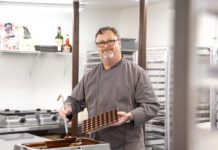Practical Glamour
Jefffrey Evans knows a thing or two about planning a dinner party. As the owner of Jeffrey Evans Design, Evans consults with clients who are planning parties, both large and small.
The first thing to remember about entertaining, Evans says, is to be kind to yourself.
“Know your limits,” he says. “Don’t try to learn to bake the day of a party. Only cook what you’re comfortable making, and don’t stress yourself by trying to make something that’s too fancy.”
When planning a holiday party, it’s best to consider small, personalized details that will make your guests feel both comfortable and special.
“Do one little thing that’s going to delight your guests,” Evans says. He suggests personalized name cards or a small box of candy at each place setting.
Evans recommends setting the table for a holiday party two days prior to the event. It allows you time to be creative and to devote your time before the party to the preparation of food.
“Use texture, color and lighting on your tabletop,” he says. “Don’t be afraid to borrow things from around the house that are interesting.
“I like to use lots of texture and give a tabletop an outdoorsy feeling for Thanksgiving. To me, (spring holidays) would call for brighter, monochromatic colors schemes with pastels, and winter holidays are glitzier and colors a little bit richer,” he continues.
Color is the most affordable way to decorate a tabletop, Evans says. He suggests using a white wedding china place setting and using brightly colored napkins to add a pop and completely change the look of the table.
“Use your dimmer switch for overhead lighting, or consider candle-lighting for the party,” he says.
Centerpieces are not always necessary, but there should be something interesting to look at on the table, Evans advises. Candles are a good option for this, be it votive, pillar or tapered candles.
When it comes to serving the meal, Evans urges his clients to set up a buffet or consider plating prior to the dinner party.
“If you plate it yourself, you can put it in the oven on warm and you don’t have to worry about the complication of passing things around the table. And it always looks more fancy if you plate it yourself,” he says.
Evans says that, in the end, a holiday party doesn’t have to be stuffy and formal; on the contrary, he says, it should be a relaxed and fun event. He says his ideal dinner party would include eight interesting guests seated at a round table with interesting conversation, an abundance of food and drink, where everyone is relaxed and doesn’t feel rushed.
Home Court Advantage
When tackling a new build project for a high-profile Stillwater family, architect Scott Vrooman of Tri-Arch made sure the space would both meet the needs and reflect the interests of the active family.
“When we started the process we thought we knew what we wanted,” the owner shares, adding that she soon realized her family needed something more.
After sharing with Vrooman and interior designer Mary Kreider what was important to them as a family, the creative team came up with a space tailor-made for the young family.
“We use every inch of that house. They did an amazing job,” the owner adds.
Vrooman began with an inspiration piece.
“We found a circular window used in the old Gallagher-Iba arena and used elements from that throughout the home,” he says of the intricate, curved designs as well as detailed ceiling and beam work.
The curved, intersecting theme is also reflected in the design of the front door, created by Cox Interiors of Campbellsville, Ky., along with the detailed beam work in the formal living room.
“I loved that sense of organized randomness,” Kreider says of the dark wood beams. From the kitchen to the master bedroom each ceiling is at once unique and unifying to the home’s design.
While the family has a shared interest in sports, the owners do have differing styles.
“One has a more rustic style, while the other likes a unique, eclectic feel. It was our job to blend those in order to create a personalized space for them and their young family,” Vrooman says of the owners.
The result was a lodge-like exterior with muted, rustic stone and gas lanterns across the front, with an interior that exudes an eclectic, Mediterranean feel with linen tones and exquisite lighting.
In creating the interior, the owner wanted to be sure it was comfortable yet distinctive.
“She is not one for overbearing or vibrant tones, so the palette features earth tones. It’s all very subtle and elegant,” Kreider says.
The team brought pops of color to the rooms by adding modern artwork selected from the Phoenix Art Group.
The owner wanted the lighting to be unique and distinctive throughout the home, and that was achieved with the help of Corbett Luxury Lighting. The pendant lighting hanging in the clubroom and the pendant chandelier in the formal dining room are standout pieces. However, the piece de resistance of the collection is the large silver and gold pendant light that hangs above the island in the kitchen.
“This was a tough piece to find. We both had an idea in mind and kept searching, but when we saw this we both just said, ‘Wow,’” Kreider says.
In addition to all the ceiling work, the floor design is also the custom work of Kreider.
The patterned flooring is a mix of porcelain tiling and hand-scratched wood, like that featured in the Atherton Hotel at OSU, located on the campus in Stillwater. In addition to the kitchen, the floor design appears throughout the home, including in the entryway and living area.
The master bath design is also a particular favorite of the owners. With a barrel-vaulted ceiling and translucent onyx countertops that light up, it encourages luxurious relaxation. A paneled wall mirror equipped with a 50-inch television mounted inside adds the final touch.
It’s not all relaxation, though, for this active family.
Leading out of the clubroom through floor-to ceiling French doors is the outdoor living area complete with a pool and waterfall system that feed one another.
Because the backyard is at a slope, Vrooman worked with the builder to create a system that allows a gradual descent. The play pool is off the back of the home and comes complete with a slide and an infinity edge that feeds the pool below through a waterfall.
The family also has access to a pond where kids can enjoy catching tadpoles and fishing. In the front area through the porte-cochere is an area to play basketball both outdoors and indoors.
“It all flows together so easily,” the owner shares. “We love every room in the house.”
While paying homage to a great sport, this unique Oklahoma residence has created a place where they and their young children can grow and family memories can be made.
Straight Shooter
There are two types of female country singers out there. There’s the girl with the pretty voice that sings cute, catchy pop country music. Her albums are safe – they please the masses and make mama say, “Well now, isn’t that sweet?”
Then there’s the country girl who blows you away – not just with her powerhouse voice, but with the meatiness of her songs, the authenticity of the conviction in her vocals and the fearless nature of her music.
You practically feel the grit from the dirt on her boots and smell the smoke from the end of her weathered shotgun. Her albums are hot to the touch and make mama a little uneasy, which only makes listening to them that much more exciting.
Want a quick lesson on the difference between these two types of gals? Throw in a Miranda Lambert CD, or better yet, catch her in concert, and hang on to your seat.
Then go back and check out her peers. The contrast will remind you of the tough hide that the original women of country music were cut from and make you sit a spell to re-evaluate what it means to be a female country artist.
Amidst the last leg of her headlining tour, The Revolution Continues, the current reigning female country vocalist of the year is still enjoying riding the high of the biggest year of her life.
With an armful of some of country music’s grandest and most sought-after accolades, a fiery new single and side project setting the pace for her new album, and her recent marriage to long-time love and fellow country star Blake Shelton earlier this year, Miranda Lambert has brought the country girl back into country music.
Oklahoma Import
A Texas native, Lambert opted out of living in Nashville to stay close to home, settling down on a working farm – complete with horses and cows and pigs and chickens – in a small town right here in Oklahoma, so that when she and Shelton aren’t touring, they can enjoy the simple, quiet country living they love so much.
Rather than choosing a pretentious couture designer gown, like celebrity brides tend to do, Lambert got married wearing the same ivory wedding dress that her mother married her father in 33 years ago. Pairing the dress with cowboy boots, she said her vows in a barn, on a cowhide rug beneath an arch made of antlers, serving her guests venison cutlets that she hunted and harvested herself.
Her fierce rock star appeal aside, it’s these down-to-earth details about her personality that seem to have resonated with her fans the most.
The “Ran Fans,” as they are called, are avid and can’t get enough of her.
“I’ve got the best fans. I have some that I know by name. I know a lot of them; they come to so many shows they’re like old friends,” Lambert says.
“I have a lot of die-hards. My fans are so passionate. Maybe it’s because I’m passionate, I attract those types of people. They’re the kind that’ll say, ‘You better love Miranda – if not we’re gonna beat it into ya!’ I love that. It feels good to have that foundation of support. They inspire me.”
It’s no wonder she’s gained such an aggressive following. The self-proclaimed “redneck chick” has an edge that commands the stage and sets the country music charts ablaze.
That said, the past year has seen Lambert catapult into the ranks of the country elite and earn the kind of notoriety that could very well help make her a one-name superstar.
Not that she needs the help. She’s got the talent and drive alone to reach those heights – and rather than waiting around for doors to open for her, she’s more than happy to kick them down herself.
It’s hard to picture it now, but she was once on the reality television circuit, competing on the short-lived, American Idol-esque show Nashville Star – but unlike the lion’s share of potentials who make it that far on those talent searches, Lambert’s 15 minutes never ended, and her career has instead thrived from the media exposure.
“It’s the reason I’m here. I’d like to think that I’d have gotten here eventually, but it probably would’ve taken me a lot longer if I didn’t have that avenue. Getting seen by the right people and having that TV audience that’s built in – you really can’t buy that,” she says.
Shootin’From The Hip
Just two years after her third-place finish, her 2005 debut, Kerosene, rocked the country music charts, going platinum with three hit singles, including the title track.
Her sophomore compilation, 2007’s Crazy Ex-Girlfriend, made her presence known as one of the music industry’s newest femme fatales, producing four more hit singles and the album of the year award by the Academy of Country Music (ACM).
But it was 2009’s Revolution that solidified her place in the big leagues, earning her honors from both the ACM and the Country Music Association (CMA) for album of the year, with her song, “The House that Built Me” making a clean sweep of the awards for best song and video of the year, top female performance, and the 2010 Grammy for Best Female Country Performance to boot.
After that kind of tremendous success, how does an artist even go about making a follow-up album?
“It was pretty scary to be honest, but I had to get into the mindset that I can’t compete with myself. There really is no way to. I feel like to be a true artist you have to keep reinventing yourself, and that’s what I try to do,” she says.
“I’m excited for people to hear some different sides to my personality on Four the Record. I’m in a much different spot in my life – even more so than from Revolution, which was very different for me – so there’s been this whole transitioning of going from a girl to an older girl to a woman. I’m a wife now, and I’m about to be 28. I think that this new album shows the side of me as being a woman now instead of that crazy girl who wrote Kerosene at 18 years old.
“I feel like I’m opening up more and opening my mind up to more things. When I say that I’m married and a wife – that’s the settled down part of who I am – that crazy girl will always be there. There’s always going to be that rock star part of me who loves to go on the road and rock out and head bang on stage.”
Honest To Goodness
To the layman, it might be easy to write her off as just another pretty blonde pop tart, given the mainstream’s ever-present obsession with yellow-tressed songstresses – but one need give Lambert credit where credit is deserved.
She’s an artist whose musical repertoire packs a punch and dark undertones that have thrived at the core of country music since the beginning – digging deep into some of the most raw and vulnerable of human emotions.
By straying away from easy sentimentality to speak from an honest, insightful and sometimes jarring level, she is adamant about never compromising substance to sell out – and this is where the storyteller in her truly shines through her writing, setting her apart from all those other blonde girls who can sing and play guitar.
This straight-shooting, no-nonsense attitude sends an empowering message to women – not in an against-men kind of way, but more in a way that encourages females to be strong, have a backbone and be confident in their own skin.
Like her idol Merle Haggard, known as the “working man’s poet,” Lambert is fast becoming the “real woman’s poet.”
But despite her fierceness, growing up in the tiny town of Lindale, Texas, Lambert says she was actually a shy and quiet child who played in the church band and didn’t get into trouble.
As private investigators, her parents were rich with stories to share with their children – and these served as the perfect tools to get the creative juices flowing in the impressionable mind of their young daughter, who always shared her father’s affinity for country music.
“When I started writing songs as a teenager, I didn’t have much life to write about yet. So I spent a lot of time listening to my parents tell stories, and there was always a lot of cheating and revenge involved. I grew up in a great home with a loving Christian family – but from that sheltered household, I could still see the outside world. My parents never tried to hide anything from my brother and I,” she says.
“We took in abused women and children for awhile. That was very eye opening. I got a glimpse of some of life’s harsh realities without having to experience them myself. "Gun Powder And Lead" and definitely "Kerosene" – songs about doing crazy things in the name of revenge – I haven’t actually done any of those things, but I’ve heard stories about people who have.”
Lambert says that she didn’t start getting into her crazy ways until she was out of high school and started playing music in bars, attributing her frisky personality to the two-and-a-half years she spent playing rough and tumble Texas roadhouse honkytonks by the age of 17, dealing with drunks and finding herself on stage while working to launch her music career.
“I did a lot of growing up in the school of hard knocks on the road when I first started out. The experience made me tough and made me appreciate what I do,” she explains.
“It was good for me. I think every performer should have to go out and pay their dues like that. It really makes you find who you are. Now, when I go out to listen to music, I’m one of those sticklers when someone else is performing who says, ‘Shhhh. Don’t talk!’”
And when Lambert says, “Shhh!” crowds shut up and listen.
Case in point: Her newest side project, the Pistol Annies, has people paying attention in a serious way to their daring and rustic flavor of classic country that pays homage to legends like Loretta Lynn and Tammy Wynette.
Comprised of Lambert and friends/fellow singer/songwriters Ashley Monroe and Angaleena Presley, the trio of Annies is topping the country music charts with their bold debut album, Hell on Heels.
“Ashley and Angaleena stand for the same things I stand for. We’re all feisty girls on our own, but put us together and we’re a force to be reckoned with. It’s pretty amazing to see a couch dream you have with your buddies turn into something this awesome. We’re having a lot of fun!” Lambert says.
Maintaining Balance
With her whirlwind year coming to a close, Lambert is ready to wind down and recharge her battery, anticipating establishing all of those fun newlywed habits and rituals with her new husband, whom she hasn’t gotten to see enough of since they’ve both been busy with touring post-wedding.
Although she loves her wild life on the road and onstage, her farm in the country – where she gardens, hunts, bakes cookies and tends to her animals – is where she says she’s happiest.
“The amount of gone time you experience on the road has been my biggest challenge. You try not to think about how many days a year you’re away from your friends and family,” Lambert says.
“Just being at my farm or my hometown in Texas to hang out and be regular – now more than ever, it’s all about balancing that real life with road life. I always want this to be fun, so I try to have that downtime at home so I don’t get burnt out. I’ve got a lot of irons in the fire right now, but luckily the irons are all hot. I’m just trying to keep afloat and keep my feet on the ground.”
Farm Fresh Gourmet
If you’d walked by the quirky, mustard-walled building at 3rd and Elgin a few months ago, you would have seen one of Tulsa’s best-known chefs – a Holland Hall and University of Oklahoma graduate – hauling huge slabs of sheetrock across the muddy floor and banging them into place with iron rods. Justin Thompson is a lot like the pioneers who built this city a century ago; he enjoys the hands-on grunt work of creation.
Walk inside that building today and you’ll see a rustic yet elegant room that welcomes diners with the glint of burnished copper, the ruddy glow of brickwork, and the subdued earth tones of pastel walls. Intricate charcoal drawings of edible plants adorn the walls.
“They’re by Taylor Young,” Thompson says. “He’s a great local artist I discovered.”
Thompson enjoys getting involved with details, with fitting raw ingredients into place to produce something a less creative person would never have dreamed of.
Finding the best ingredients, using local sources, perfecting his technique and adding creative vision and a lot of sweat and hard labor: that summarizes Thompson’s philosophy of building, probably of life, and certainly of cooking.
“How you sear the meat, how you make the sauce,” he says. “Good cooking is all about technique.” He pauses a moment. “I take a basic idea and make it better than it was before.”
He’s done it before. His physician father (who, incidentally, helped haul that sheetrock) hoped Thompson would follow him into the profession, but at OU Thompson spent more time cooking than studying his major (philosophy and zoology). He had found his vocation. A few years later, he opened his first restaurant, Ciao, on Brookside. Later, by now discovered by Tulsa super-restaurateur Tim Baker, he created The Brasserie and Sonoma. Exciting at first, his work there later became routine: supervision and administration.
“I missed the thrill of holding a vegetable fresh from the farm in my hand and figuring out what I was going to do with it,” he says.
Thinking of the long hours of hard, hot and sweaty work that it takes to run Juniper, Thompson’s eyes light up like a small boy’s at the gates of the Tulsa State Fair.
He devises a new menu every week. On Sunday and Monday, when the restaurant is closed, he and his talented sous-chef, Trey Winkle, meet with the dozen local farmers with whom they collaborate (tiny farms such as Three Springs Farm in Cherokee County), determine what is the best fresh produce they have available that week, and plan the menu around that. There is also a short menu that doesn’t change. It includes such dishes as sweet carrot soup with lobster and cognac cream, cucumber and local goat cheese salad with sweet Hendrick’s gin vinaigrette and rose petal focaccia (the focaccia complements the rosewater flavor of the Hendrick’s gin, says Justin), and coffee-rubbed rib eye served atop a fennel and wilted onion confit. The cooking pairs French technique with southern European ingredients and flair. Like everything else in Juniper, it is quintessentially Justin Thompson. 324 E. 3rd St., Tulsa. www.junipertulsa.com
Call Him Unstoppable
Remember the image of a young Dustin Hoffman racing toward Berkeley in a fire engine-red Alfa Romeo Spider in 1967’s The Graduate?
Would it be as memorable without Simon and Garfunkel’s songs driving the inner drama?
As one-half of the famous folk duo, Paul Simon lost no time as a solo performer giving his audience albums that chimed with fans as well as critics. He has earned 12 Grammy Awards – the albums Bridge Over Troubled Water, Still Crazy After All These Years and Graceland won album of the year honors – and numerous other honors that include induction to the Rock ‘n’ Roll Hall of Fame and recipient of the Kennedy Center Honors.
With so much acclaim to his name already, Simon could rest on those abundant laurels and “retire” from the biz in a cloud of media fury. Instead, he quietly released his first album in five years. April’s So Beautiful So What has been called his best since 1986’s powerful Graceland, most of which was recorded in South Africa with such groups as Ladysmith Black Mambazo.
He set out on tour soon after, but then last month Simon released Songwriter, a collection of songs on two discs delivering some of his best-known work as well as those less often heard but no less bearing all the marks of his genius for writing popular music.
The songwriter heads to Oklahoma City Civic Center Music Hall for a Nov. 6 concert. Showing no signs of slowing down, Simon, perhaps, may be that artist/performer who refuses to tease with the “r” word. The American songbook wouldn’t have it any other way. For tickets, visit www.myticketoffice.com.
Just Desserts
Roasted Pecan Ice Cream Ball
Cheever’s Café
Homemade vanilla ice cream, chile-spiced pecans and a trio of sauces are the basis of this fabulous dessert offered by the Southwestern-inspired eatery, Cheever’s Café in Oklahoma City, for a decade. A crunchy pecan crust smothered in dark chocolate and white chocolate sauces and cajeta give way to the creamy ice cream waiting inside. Henri Bailey, general manager of Cheever’s Café, says the ice cream ball was created to replicate a frequent customer’s favorite dessert experience.
“He described this creation to us, so we did our best to duplicate it without ever trying the original,” Bailey shares. “We did a pretty good job because that customer still orders it every time he comes in.”
The enormity of the ice cream ball may seem daunting, but Bailey stresses that the flavors are simple and traditional, which is why it’s such a hit with patrons.
Which Hollywood celeb would be most likely to eat your dessert? “(Actor and Oklahoma native) Rex Linn has eaten it many times.”
.jpg)
Peach Cobbler
Evelyn’s
Cobbler is a staple of southern kitchens: a simple dessert of fruit in a thick, sweet sauce that is topped with delicate crust and most likely served with love. At Evelyn’s, the dive best known for making what is arguably the best fried chicken in Tulsa, Wanda Armstrong is also churning out the best peach cobbler, hands-down. Armstrong, who is 63 years old, has been making her peach cobbler for nearly half a century. The secret, she says, is in the crust.
“You have to have a good crust,” she says. “People like the plain, simple old-fashioned taste of peach cobbler, but the crust has to be good.”

Baked Chocolate Pudding
Dragonmoon Tea Company
It’s mind-boggling how the combination of five ingredients – five basic baking staples – can create something as velvety and rich as the baked chocolate pudding at Dragonmoon Tea Co., a teahouse in midtown Tulsa. Comprised simply of Belgian dark chocolate, cream, egg yolks, sugar and vanilla, this dessert is served chilled at the small Tulsa teahouse, and is best enjoyed with one of Dragonmoon’s signature teas.
“The Chocolate Mint tea brings a little lightness to the dessert, but our Florence, flavored with chocolate and hazelnut, is lovely as well,” says Susan Blair, co-owner of Dragonmoon. “For a purely decadent combination, I would serve our Scottish Carmel Pu-erh. This tea has the same rich, creamy finish as the pudding.”
Which Hollywood celeb would be most likely to eat your dessert? “Johnny Depp; who better, with his roles in Chocolat and Willy Wonka and the Chocolate Factory?”
Banana Crème Brulee
Palace Café
The inspiration for this whimsical signature dessert all began with a dish and a dream by the Tulsa restaurant’s owner, James Shrader.
“(I saw) a really cool ceramic boat while shopping with my wife,” he recalls. “When I saw it, I said to myself – and the boat – ‘I’m going to make you famous.’”
Fresh ingredients – including heavy cream, Lomah Dairy milk, Tahitian vanilla and fresh bananas – are a big draw for customers who order the dessert, typically prepared by pastry chef Jessica Burge, and, as Shrader says, “a lot of people are suckers for a good brulee in the first place.” The presentation of the dish, complete with that now-famous ceramic boat and pulled sugar sail, certainly doesn’t hurt, either.
If your dessert were a song, what would it be? “‘Come Sail Away,’ by Styx.”
Which Hollywood celeb would be most likely to eat your dessert? “None who are too skinny.”
Vanilla Bean Pot de Crème
The Metro Wine Bar and Bistro
A simple dessert with a lengthy history, the Pot de Crème traces its beginnings back to 17th-century France. So when LaVeryl Lower decided to open The Metro Wine Bar and Bistro 23 years ago in Oklahoma City, the dessert that first came to mind to include on the menu for her French-inspired restaurant was, of course, Pot de Crème.
“We felt like it was a perfect dessert for a bistro,” she says. “You can’t get Pot de Crème anywhere else in the city that I know of. It’s simple and creamy and almost like a comfort food dessert.”
The Pot de Crème at The Metro is served with fresh berries and three decadent sauces: chocolate, raspberry and caramel. And the best way to enjoy it is with a glass of champagne, says Lower.
If your dessert were a song, what would it be? “‘One Fine Day,’ by Norah Jones. Smooth and easy, just like Pot de Crème.”
Dark Chocolate Soufflé
Rococo Restaurant & Fine Wine
“Chocolate air” may seem an other-worldly or ethereal idea for dessert, but that’s exactly what Chef Don Duncan, managing partner at Oklahoma City’s Rococo, is aiming for with his dark chocolate soufflé. Only on the menu for a short time, the soufflé is quickly gaining in popularity.
“The chocolate we use is a higher-end dark chocolate, one of the finest you can get,” he says. “The soufflé is the champion of all desserts. To me, it’s the most refined way you can play with food textures.”
Duncan recommends pairing the soufflé with Grand Marnier, which he says complements the flavors.
If your dessert were a song, what would it be? “Something sexy, like ‘Let’s Get It On’ by Marvin Gaye.”
Which Hollywood celeb would be most likely to eat your dessert? “Brigitte Bardot.”
Ice Cream Beer Float
RePUBlic Gastropub
It’s a playful riff on the more traditional root beer float, but with a little kick. The Ice Cream Beer Float at RePUBlic Gastropub contains two ingredients: vanilla ice cream and Young’s Double Chocolate Stout beer. The combination of the two may seem a little off-putting, but don’t knock it until you try it. The beer quickly melts the ice cream, creating a soupy, sweet substance in the cup that packs a wollop.
The dessert has been on the menu since RePUBlic’s opening in April 2010 in Oklahoma City’s Classen Curve, and Chef Beth Ann McFarland says it’s most definitely the beer factor to this dessert that keeps people coming back for more.
Apple Tarte Tatin
Polo Grill
The Apple Tarte Tatin made its debut in the Hotel Tatin in France more than a century ago, but it made its first appearance in Tulsa’s fine dining restaurant Tulsa’s posh Polo Grill just last fall. Though a relative newcomer to the menu, the dish has earned a healthy following.
“With colder months arriving, our thoughts in the kitchen turn to comforting baking spices,” says Polo Grill executive chef Michael Funk. “When Michelle Donaldson, our Sous Chef at the time, first came up with the dish, she was looking for a twist on a French tradition, and this has hit the mark.”
Funk says it’s the warmth of the baked apples and homemade butterscotch that makes it such a treat for customers, and suggests ordering Coteaux du Layon, a sweet white wine from the Loire Valley of France, to complement the dessert and fully experience the tart.
Which Hollywood celeb would be most likely to eat your dessert? “Pierce Brosnan as James Bond.”
Snickers Brownie Pie
Michael V’s
The Snickers Brownie Pie may play second fiddle to the Coconut Cream Pie on the dessert menu at Michael V’s in Tulsa, but the rich, decadent flavors of the former are what land it on our list of great desserts.
Imagine a brownie-bottom pie that is layered with pieces of Snickers bar, cheesecake filling and chocolate ganache and topped with chopped, toasted peanuts. That’s exactly what Michael V’s chef and owner, Michael Minden, imagined in a dream, and he added the dreamy concoction, which is best paired with a rich red wine, to his menu in 2009.
A River Runs Through It
In Little Rock, it’s called the River Market District. In San Antonio, it’s River Walk; and in Fort Lauderdale it’s just plain Riverwalk. What these urban waterfront districts have in common is that their development into centers of commerce, entertainment and recreation have been instrumental in the revitalization of downtown areas that were languishing in previous decades as more and more of their host cities’ population migrated to spacious suburbs.
Meanwhile in Tulsa, the Arkansas River basin snakes through 11 miles of city and 42 total miles in the greater regional metro corridor, with only occasional water flow, notably little sporting activity and only small patches of shoreline development. Kayakers no longer use the Tulsa Wave. The Blair Fountain sits dormant.
In some ways, Tulsa’s slow pace in maximizing use of the river is driven by historic and outside factors. The city sprung up more around the railroad than it did the river. And being a prairie waterway, the environmental restrictions and requirements for developing along the river dwarf those of most other urban waterways. But economics, bureaucracy and suburban apathy have also played a role in deterring maximizing usage of the river.
Still, the future of the Arkansas River in Tulsa is not bleak, and it’s not gone from the agendas of regional civic leaders. Progress is coming to the shores of the world’s 45th longest river where it vivisects Tulsa County. But exactly when riverfront development happens and exactly what form it takes remain questions with ambiguous answers.
Water Works
“One major differentiating factor in regards to river development here versus other communities is that their rivers have water in them,” says Mike Neal, president and CEO of the Tulsa Metro Chamber. “The disadvantage to the Tulsa region is that frequently there is no water in the river. It’s hard to develop without water regularly in the river.”
Water flow is key to subsequent phases of river development.
“People have a strong desire to come to the river and enjoy the ambiance,” says Rich Brierre, executive director of the Indian Nations Council of Governments (INCOG), the Tulsa regional planning organization. “Whether it’s a beach, a lake or a river, the waterfront is something that attracts people.”
Currently, the flow of water is controlled in large part by Keystone Dam and to a lesser extent by the Zink Dam in Tulsa proper. According to local authorities, renewing the river through Tulsa as an actual flowing waterway would require substantial improvements to the Zink Dam and the construction of two additional low-water dams in Sand Springs and in Jenks. Just under $6 million was pledged from Vision 2025 funding, but that remains far less than what is needed.
“The initial master plan said it would cost $60 million, but current estimates are around $100 million with pedestrian walkways,” says Gaylon Pinc, environmental program manager for Project Management Group, the consultants tasked with implementing Vision 2025 projects.
However, while improvements to the Zink Dam are underway and anticipated to continue for another three years, according to Pinc, funding for the new dams remains elusive. In 2007, county voters rejected a small sales tax increase aimed at creating a revenue stream. Local philanthropists had pledged a significant amount of private investment in the plan as well. Details of the vote reveal divided sensibilities when it comes to moving ahead with river development – and the divide was largely geographic.
“It was defeated 52-48,” says Chris Benge, former speaker of the Oklahoma House of Representatives and Tulsa Chamber senior vice president of Government Affairs. “It actually passed in the city but voters in suburban communities rejected it because they didn’t see the benefit to them. The plan was for public money to be used for the three low water dams to keep water in the river. Private investment would then be made in riverfront development.”
According to Pinc, the 2007 vote was also tarnished by misinformation.
“Opponents of the plan claimed that the plan could never get permitted, which was and is just not true,” Pinc says. “The Army Corps of Engineers was involved the whole time. It was their plan. They weren’t going to deny permits for their own plan.”
About a year later, optimism abounded when the state offered a $25 million potential bond to support projects. Leveraging monies from the state and Vision 2025, local authorities were able to pony up matching funds and were to rake in the federal funding needed to get the river infrastructure projects underway.
Then came the recession.
“We had all the matching funds we needed for federal funds and then the economy fell apart and Congress did away with earmarks,” Pinc says.
Brierre said the timing was unfortunate.
“The money was authorized but not appropriated,” Brierre says.
Pinc says that the next phase depends upon what path elected officials choose.
“They could fund the necessary studies without the Army Corps, except the regulatory process,” he says. “Or else they can just wait for federal appropriations to resume. There is a lot of bureaucracy but identifying funding is very important to these projects.”
Brierre says that Tulsa County is moving ahead as best it can, given the dearth of resources. Considerable studies and planning are intrinsic to the Zink Dam improvements.
“There are processes that have to be gone through so that when funding is available, we can move ahead on the two other low water dams,” Brierre says.
Although Benge says Oklahoma’s outlook for federal dollars is not great because of the elimination of earmarks and federal budget constraints, “everyone is being mindful to when federal money comes back, the permitting will be in place to move on.”
Still, even if the entire dam project should be funded tomorrow, the road to completion is a lengthy one. According to Pinc, preparing permits and conducting an environmental impact study would take 12-18 months. It could then be 18 months or more for the process approval. Final design would then take as long as a year. Construction would then take two more years.
“You might add a year to that overall process, and that’s assuming total funding,” Pinc says.
Of course, it’s possible that local and regional funding availability could speed the process.
“Certainly there is the potential to go back to the voters,” says Neal.
In the meanwhile, the river sits with only occasional spotty water flow, not quite dormant, and possessing the potential energy to drive the next phase of Tulsa’s evolution.
On The Shore
In addition to scenery, other cities’ urban waterfront development has something else in common. In general, the shores have become bustling entertainment districts with contiguous properties housing businesses that complement one another. But assuming the infrastructure improvements are made on the Arkansas River in Tulsa, development on the shore is likely to look much different.
“The Arkansas River is very different,” says Brierre. “San Antonio’s River Walk is a very narrow channel. So is the Oklahoma River in Oklahoma City. Our river is one of the largest in the United States and has a wide channel. It’s very different than others. It’s more of a natural setting and I think the public embraces that. What’s eventually done has to reflect the diversity of people’s interests.”
Those interests are reflected in a master plan, crafted in a regional effort, that has a very subjective view of development on the river.
“Vision for development on the river is real fuzzy, in my opinion,” Pinc says.
Instead of a detailed plan including zoning and density recommendations, corridor-exclusive setbacks, unified parking requirements, etc., the plan instead respects different municipalities’ regulations and blends suggestions for open space mixed with various potential development.
“There absolutely would be a component of water recreation,” Pinc says. “We don’t want swimming, but the new low water dams would support fishing, boating and rowing.”
Pinc says there are opportunities for entertainment districts.
Brierre says the master plan envisions development at strategic locations, and includes areas where development is possible and areas of critical mass. However, neither local municipal governments individually or collectively can at this point craft a more cohesive, unified plan – because there are numerous property owners on both shores of the river. Among prominent entities with real holdings or proprietary control of riverfront property are the city and county, River Parks Authority, the Creek Nation, the George S. Kaiser Family Foundation and other private interests. There’s also a designated protected wildlife area. As a result, there are few clear, large contiguous parcels of land available for easy and obvious development.
Of course there has already been some riverfront development and there are some efforts for more.
Tulsa Mayor Dewey Bartlett says that Blue Rose Café is a good example of successful development and partnership between public and private interests.
He says he recently appeared before River Parks Authority and suggested that the RPA, a city-county public trust authority responsible for considerable real estate along the river, pursue other projects similar to Blue Rose.
“I told them that Tulsa can help,” Bartlett says. “We own land at intersections of Riverside Drive and a lot on the west side. We can participate with property and parking. I visualize a situation where the city could provide trolley transportation and maybe run all the way downtown.”
Matt Meyer, RPA executive director, says that different people have different ideas on what “development” means, and he ponders, “How much of the park do we want to pave over?”
RPA is responsible for arguably the most popular development along the river – the extensive trail system whose development and improvement was funded by the Kaiser Family Foundation. That wildly popular trail system has prompted considerable activity along the river’s shores.
A public plaza at 41st and Riverside, funded in part by major donor QuikTrip, has also been a lauded addition to the corridor.
Other development efforts have met with less success. The City, for example, issued a request for proposals for development of a 100-acre-plus parcel on the west side of the river, and including where city water and street department infrastructure is housed and a private cement plant parcel with an owner willing to sell as part of the deal, Bartlett says. But the handful of proposals received apparently did not pass muster and there has been no additional attempt to develop the location.
“We’re still confident something could happen,” Bartlett says. He adds that he feels the state of the overall economy was the largest obstacle.
Furthermore, Bartlett says that the Kaiser Family Foundation will be announcing plans for an extensive $100 million development on the west side of the river.
“I haven’t seen the plans but I have heard a lot of things,” Bartlett says.
Most residents though would point to the Riverwalk in Jenks as the most polished major development along the river in the region. A large land parcel and city zoning and guidelines spurred the development. Although many Riverwalk businesses have struggled as the recession finally arrived in Oklahoma, others – notably popular restaurants like Los Cabos and Waterfront Grill – have done well and helped breathe life into the riverfront in Jenks.
“It absolutely does help to have other development close to where you’re developing,” says Ben Edwards, project manager for the highly anticipated mixed-use development Village on Main in Jenks. “No development can stand alone.”
Riverwalk, the Oklahoma Aquarium, components of Village on Main as they come online and other development in the area has helped create a critical mass.
“Having a large attraction like the aquarium, then Riverwalk, play into what we’re trying to do… to become a destination: Jenks, America,” Edwards says. “For us, the river plays a big part in that. In the near future when the low water dams are in, it will become a place for people to walk along and enjoy the scenery. We’re building a kind-of town center and people should be able to walk down the street to shops and eventually to the river to enjoy.”
Downstream
Whatever eventually transpires when it comes to development along the Arkansas River in Tulsa might appear far downstream and past a turn or two in the path, but there is a sense of urgency already today.
“If we don’t go forward and get permitting out of the way and prepare for when funding becomes available, we’re likely to lose momentum,” says Pinc. “Data will become aged to the point that it needs to be re-done. I think there is a desire in the public to get something done. People just don’t want to pay for it.”
Bartlett says that failure to continue pursuing riverfront progress would be “very short-sighted.
“I hear it all the time – ‘let’s do something,’” Bartlett continues. “I’m not saying let’s limit development to bars and restaurants. There are all sorts of possibilities. We have to start. We have to keep moving. We can’t wait a year or two. Look at what Oklahoma City has done – they got a couple of backhoes out and built a river.”
Benge sees river potential as part of a larger economic look at Tulsa.
“We have low unemployment; we’ve had a major renaissance in downtown, and millions of dollars have been invested in new roads and highways,” Benge says. “Tulsa has a lot of momentum right now.”
From Gridiron to Grapevine
During the Dust Bowl days, the Joad family made their way across the West in search of a better life in California in the timeless epic The Grapes of Wrath. The Golden State is again attracting a famous Oklahoma family. But this time it’s in pursuit of a better glass of wine.
University of Oklahoma coaching legend Barry Switzer has teamed up with some of the biggest names in Napa Valley to establish Switzer Family Vineyard.
Earlier this year, they kicked off the new business venture with the launch of its vintage 2008 Cabernet Sauvignon, a wine Switzer says is sure to please even the savviest wine drinkers.
“Unsolicited people have told me it’s better than what they expected, and I like that comment,” Switzer says. “I haven’t had anyone say anything negative about it and they shouldn’t. Because anyone who knows anything about wine, they know when they taste this, this is a good cabernet.”
Switzer says his family kicked around the idea of starting a winery for a couple of years. But like his Sooner teams of the past, the old coach wouldn’t accept anything but the best. To keep that winning tradition alive, he partnered with Napa Wine Company’s Andrew Hoxsey and Republic National Distributing Co.
“I never thought of being on a bottle of an alcoholic beverage, but we start talking about it and then went out there and had some meetings,” Switzer says. “Once we knew we wanted to do it we got involved with the right team and right product.”
Switzer Family Vineyard started out small this year with a batch of 560 cases of wine. They plan to push production to 750 cases next year, then 1,000 the following year with the possibility of doubling that number in the future.
The wine is available at liquor and spirit shops across Oklahoma and neighboring states.
“The target market is the old Big 8 conference, and we’ll go from around Dallas all the way to Nebraska,” Switzer says. “And it will be available in my home state of Arkansas.”
Growing up the son of a bootlegger, Switzer never imagined he’d follow a similar path. Especially not in the wine industry, which was almost non-existent in Arkansas and Oklahoma in the 1950s.
“When I was a student at the University of Arkansas in the 1950s, I used to drive through Altus, Ark., where they had Wiederkehr Winery, and it stood out because at that time there weren’t big California wines or American wines,” Switzer says. “I always thought wineries were in France and Italy, but here was one making wine in Arkansas in the ‘50s.”
The wine industry gradually made its way to the area. Today about 100 wineries exist in the state, while more Oklahomans are sipping red and white wines.
“There has just been an explosion of wineries in the state and it’s amazing because weather is so harsh here,” Switzer says.
Switzer says he began drinking wine about 30 years ago at the urging of longtime friend Patsy Benso.
and we’ll go from around Dallas all the way to Nebraska.”
“He was giving me a lecture, as he always does, and he said, ‘If you’re going to drink, drink wine and drink red wine,’” Switzer says. “He said, ‘It’s better for you, and it’s not as hard on you as the whiskeys and bourbons.’”
Switzer took the advice but said it wasn’t until several years later that he developed a taste for fine wines.
While coaching the Dallas Cowboys, Switzer regularly dined with team owner Jerry Jones over elaborate dinners on the night before games. Along with enjoying some of the finest food in the country, Switzer’s wine palate evolved.
“When we went out for diner, Jerry would tell me to order the wine, and I found out the price doesn’t always mean it’s the best tasting wine for your palate,” Switzer says. “I found out lots of good wines don’t cost as much.”
And like many wine connoisseurs, Switzer and his family made their way to Napa Valley to enjoy some of the finest wineries in the country. During those trips, they threw around the idea of opening their own label. To get a better perspective on the possible business venture, they contacted Hoxsey, a fourth-generation grape grower and one of the leading winemakers in Napa Valley.
Switzer says Hoxsey was very receptive to the idea. While in town for a marathon, he visited the Switzer home and helped develop a plan for Switzer Family Vineyard.
“We wouldn’t have done this without (Hoxsey) because like I told my son-in-law, there’s no way I would put a wine out there with my name on it that we did not feel was a real quality product,” Switzer says. “It wasn’t about trying to really be a commercial venture to make a lot of money. It was about doing something fun and something that we were interested in. To do that we wanted the right people and the right team. And that’s what’s happened for us.”
The company later signed a long-term contract for grapes to be grown in Oakville, Calif. In two years, they will have their own vineyard space where the grapes will be grown and harvested.
Switzer says they might add a pinot noir wine in the future, but for now they are putting their efforts into the cabernet.
“Andrew Hoxsey told us not to do a bunch of wines, but do a great wine and establish the product,” Switzer says. “It’s all about the palate and making something people enjoy.”
Easy Entertaining
I don’t like entertaining – not if it involves 3.2 trips to the grocery store, teetering piles of dishes, frantic, last-minute house cleaning and opening the door with food on my clothes.
If, however, I can do a little bit each day to get the house in shape, the food purchased and prepared as much ahead of schedule as possible, then I’m totally into the occasional dinner party. It’s the basic “Flylady” philosophy of taking baby steps so that you can fully enjoy yourself once your guests arrive.
Marla Cilley began the Flylady program (www.flylady.net) more than a decade ago and has more than a half-million users, including me. The basic principle is to tackle housework and cooking with small steps so you don’t get overwhelmed and give up. If you keep up with the baby steps, you work your way from chaos to peace and tranquility. Since starting her program I’m much more organized. Whenever I host a dinner party I feel her wise eyes peering over my shoulder, guiding me to select recipes which are not only delicious but can be made ahead – fuss-free.
Now that we’re entering the heart of the entertaining season, I am putting simple, yet impressive, desserts in my bag of tricks. One of the most “fly” desserts I can think of is Tiramisu. Cilley would love this popular Italian dessert because: 1. It is simple to throw together; and 2. Making it means you’ll never answer the door with food on your clothes because you have to make it at least 12 hours before you need it. Definitely fuss-free. Definitely fly.
Tiramisu Trifle
After a hard day, tiramisu is easy. It’s the perfect dessert for fancy parties and casual get-togethers. Also, Tiramisu is glory on a spoon. Glory that you can scoop up at midnight, when no one is looking (as long as you don’t mind espresso at midnight).
Note: Please begin this recipe the night before you need it. If serving to children, you can swap out the espresso for hot cocoa. Finally, you can make caster sugar (a.k.a. superfine sugar) by putting regular granulated sugar in a coffee grinder or blender and pulsing until powdery but not caked.
4 eggs, separated – the freshest you can find
1/3 c. caster sugar
3 8-oz. containers marscapone cheese
40-60 lady fingers (Italian Savoiardi)
2 tsp. dark cocoa powder
For the dipping liquid:
(Note: Considering I like my tiramisu dry – not squishy and soggy – this makes a ton extra; feel free to cut it by half or more.)
2 c. water
3 tbsp. instant espresso
3 tbsp. rum
First, mix up the instant espresso with warm water and rum in a small bowl. Next, divide the egg whites and yolks into two separate bowls (the larger being for the yolks).
Whip up the egg whites with half the sugar, until the mixture looks like a soft cloud. Then – without washing the beaters – mix the rest of the sugar with softened marscapone and egg yolks. Softening the marscapone on the counter makes it whip up smoothly, so you don’t get lumps.
Next, fold the whipped egg whites into the marscapone mixture. Once it’s light and fluffy, get your trifle bowl out and begin layering the tiramisu.
To assemble, first put a layer of the whipped marscapone mixture into the bottom of your trifle bowl. Then add a layer of lady fingers – each lady finger gets dipped into the coffee mixture before going onto the tiramisu. You don’t want soggy tiramisu; I recommend kissing each side of the cookie to the surface of the espresso – that way the lady fingers soak up just enough espresso flavor, without making the tiramisu soggy. So, go ahead, let your cookies kiss the espresso.
Now, here’s another important lesson for you. If you aren’t careful when you layer the cookies they’ll taste good but they won’t show up on the outside of the glass. To make the outside look good, you’ll need to break the lady fingers in half, dip the cut end into the coffee mixture and press it against the glass, making a seal, so the custard doesn’t leak over it, hiding the cookie.
Keep alternating between a cookie layer and a marscapone layer, until the trifle bowl is filled. Finish with the marscapone mixture and a heavy dusting of unsweetened cocoa powder. Refrigerate overnight to let the flavors develop.
You’ll end up with the prettiest tiramisu trifle. And you’ll be able to go to bed with a smile, knowing you have nothing to do the next day but to enjoy yourself and your guests.
Sasha Martin is cooking one meal for every country in the world. Her picky husband and baby girl are along for the ride. Join the adventure for recipes, reviews and more at www.globaltableadventure.com.




























